天津惠灵顿总校长Julian Jeffrey解读如何打造21世纪人才的软实力
2021年11月20日,由京领新国际主办、德胜教育承办的第十一届京领创新人才论坛暨德胜教育二十周年 · 德胜学校(国际)十周年教育峰会在德胜学校(国际)成功举办。
围绕“未来学校的创新人才培养”主题,第十一届京领创新人才论坛暨德胜教育二十周年 · 德胜学校(国际)十周年教育峰会内容覆盖世界名校创新人才培养实践、优秀国际学校创新人才与科研素养培养经验、未来创新人才培养路径等议题,旨在通过分享现实经验和研究成果,启发国际教育者们挖掘规律、探索路径,用研究指导实践,促进国际化创新性人才培养。




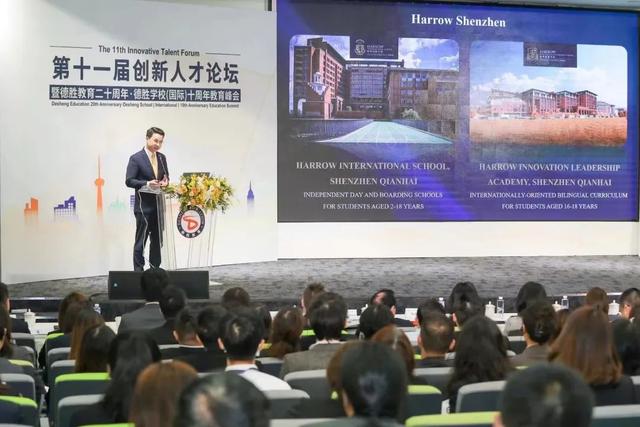

这是一场国际教育者学术交流的思想盛宴,是一场汇聚世界顶尖学者智慧与重磅专家学者经验的宝贵经验与研究成果的教育盛会。
本次论坛聚焦“创新”这一主题,邀请了国家教育督学、教育部原政策法规司司长、中国教育战略发展学会执行会长与中国教育政策研究院副院长,以及来自哈佛大学、剑桥大学、牛津大学的学者教授,来自北京京西学校、北京市鼎石学校、青苗国际双语学校、天津惠灵顿学校、天津英华国际学校、华南师范大学附属中学国际部、哈罗深圳外籍人员子女学校、深圳万科梅沙书院、上海新加坡外籍人员子女学校、上海学领集团、苏州领科海外教育学校、杭州惠立学校等北京、上海、广州、深圳、苏州、杭州、天津等地的知名国际学校、教育集团的校长共话创新人才培养,着眼当下、前瞻未来,立足中国、放眼世界。
本次论坛中,天津惠灵顿学校总校长Julian Jeffrey 以“打造21世纪人才的软实力”为题发表了精彩演讲。
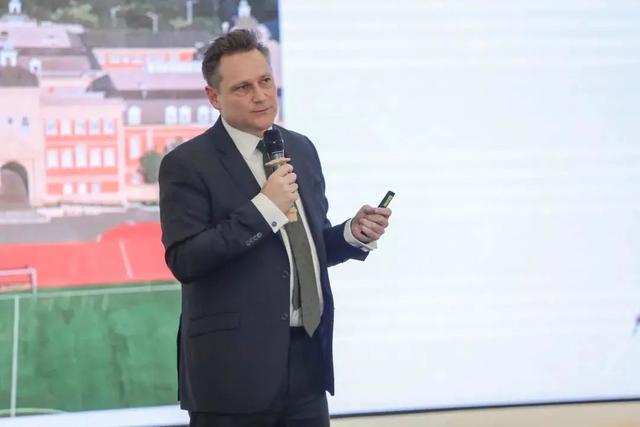
Julian Jeffrey
天津惠灵顿学校总校长
演讲主题《打造21世纪人才的软实力》
01
演讲内容回顾
女士们、先生们,大家下午好。非常感谢主办方邀请我演讲,首先,我想祝贺京领,同时,祝贺德胜教育成立二十周年、德胜国际学校成立十周年。我特别要祝贺郭总培养出了不起的学生们,今天上午我很荣幸有机会与这些了不起的学生相处,特别是为我做介绍的两位学生,他们做了很多工作,让我感到宾至如归。
我身后屏幕上的这个演讲标题(“为生活而学习”)可能会让人感觉主题模糊不清。实际上,我今天真正想分享的是我们课程中的一部分,可能不是所有的学生和老师都会考虑到的东西。今天我们已经听了很多关于教学课程的内容,例如,技术创新很可能成为创新、技术和STEAM教育相结合的一个大领域。还有刚才京西学校分享的他们的整个教学计划是如何在面向创新中发展的。
但是我今天想讲的是“非教学课程”,我想以学生在我们学校得以获得的深刻的学习之旅为例,谈一谈我们应该如何通过学校教育让学生受益终生。虽然我将采用我们学校的例子,但我从心底里认为这是一个普遍的信息。
首先我们来讲讲教育的未来。这是联合国教科文组织关于教育的一个报告,其中介绍了价值观在“为年轻人的生活、工作和公民身份做准备”方面的重要性。就培养未来公民而言,基本上我认为这个理念是正确的:“虽然价值观与态度不能与认知理解分开,但人类行为的感情(或情绪)方面与之有关。”这就是我想和大家说的。可能我所要讲的内容看上去与创新没什么联系,但是我认为创新人才一定是兼具勇气和创造性的人,我们教育的目的就是让孩子们成为这样的人。这个过程就需要通过我刚才提到的“非教学课程”来实现,我们要为孩子打造一个适合的环境和氛围,让孩子们的品质在这样的环境中得到更好的发展。
我们赖以生存的价值观和态度会影响我们和他人的关系。说到全球公民,大家今天谈论了许多关于“世界无国界”的内容,刚刚陈校长讲的“无国界学习”引起了我的共鸣。大家可以思考一下我们学习的方式以及目的是什么。上学和考试只是我们生活中非常微小的一部分。在我们十七、八岁的时候,它以非常狭隘的方式定义了我们的成功或失败。但是,当我们到28岁或者38岁的时候,这些就变得不那么重要,但这时候如何做好一名全球公民对我们来说意义重大。学校应该在培养全球公民和相关技能方面发挥一定的作用。
这张幻灯片(“65%的学生最终将从事尚不存在的职业”)让我感到震惊。如果你现在坐在这个房间后面,而且你在几年后或甚至今年就要参加考试,而你看着这个,想:“好吧,我正打算成为一名会计或我正打算成为一名航空飞行员。而突然,有一个人在台上告诉我,我们65%的人最终不会从事目前存在的职业”。当然,这可能会发生也可能仅仅是危言耸听,大家不必过于介怀,因为这是一名“未来学家”声称的,而“未来学”并不是真正的科学,这句话也只是人们口口相传而未经验证。去拥抱未来而非止步不前,你们现在接受的教育会让你们有机会学习必要的课程,让你们学会学习,让你们丰富文化知识和心灵,让你们比起父母和祖父母那一代更能适应未知的生活。对我来说,非常重要的一点是,我们学校的老师不以我所受的教育方式来教我们的学生,我们正在尝试以我们希望和期待的方式来教育你们。
那么,让我们从最基本的价值观说起。我们惠灵顿有五个核心价值观——责任、勇气、尊重、善良和正直。几乎每所好学校都有自己的价值观。事实上,刚才也有很多嘉宾谈到他们学校的价值观,它们不可避免地有一定相似之处。现在很少有学校会说自己学校没有价值观,因为家长不可能让自己的孩子进入一所没有价值观的学校。
我们学校的核心价值观也是我们的教学和非教学课程的一部分。如果我们一直在课堂上谈论价值观,那么我们的课程会变得非常无聊,孩子们也会觉得无趣。我这里所说的非教学课程包含了教会学生如何生活,包括通过价值观来引导学生、教职工和家长的行为方式。实践和贯彻价值观是在惠灵顿学习的基础。孩子们从2岁到18岁都要经历这个过程,我们希望学生能够理解我们的价值观并贯彻到实际生活中,并且我们还希望学生们能通过非教学课程中的这些价值观的潜移默化走向更加光明的未来。
在我身后的这张幻灯片上,你会看到外圈有五个单词组成了惠灵顿的“特质”。英语中很容易想起五个以“I”开头的单词,这些词往往听起来都很重要,比如‘intellectual’, ‘inspired’,和‘inclusive’等等。但是因为翻译时字母“I”不在了,所以没有了原有的效果,但这些词语包含的价值和目标是一样的。我不太喜欢从产品的角度谈论教育,但实际上,惠灵顿的“特质”确实是我们系统教育的一种产品,因为我们期望我们的孩子经过学校的教育,在18岁毕业的时候能够成长为具有惠灵顿“特质”的人。但我明白,在国际化学校的背景下,学生会随着父母合同迁移和诸如此类的事情搬家,但年龄较小的学生通过在我们学校学习一段时间后也可以发展出一些这样的特征或者如我们所称的“特质”。
也许现在大家可以看到我们的非教学课程对我们学生的影响越来越大,因为这些是离开我们的毕业生作为惠灵顿人的特征,他们去了世界各地的名牌大学。我总是很羡慕他们!他们能够去世界排名前十的那些极其优秀的大学!他们有个性且包容;他们有着高超的学术能力,同时又十分独立。毫无疑问,我们学校既培养了非常优秀的学术人才也培养终身学习者。这是惠灵顿期望我们的学生在成长过程中所具备的特质之一。
接下来,我们聊一聊家校关系,这是一个对于家长和教师来说都很复杂的话题。如果你是一名家长,你会知道我所谈为何。家长可能会考虑究竟应该怎样才能让自己的孩子更加主动地学习。他们有时候花好几个小时盯着孩子学习,但孩子们的表现似乎令人失望和愤慨:他们每天仍然玩十分钟的电子游戏;他们在本该学习时候却在放松休息。作为一个家长,我该如何让孩子自主学习呢?这张来自英国惠灵顿公学的幻灯片(“阿瑟·韦尔斯利,第一代惠灵顿公爵”)是我为我们的学生和家长举的一个例子,英国惠灵顿公学是天津惠灵顿学院的姐妹学校,我曾经在那所学校工作了18年。
在每年的演讲日,会有两名最勤奋、最优秀的学生获得女王颁发的奖章。这个学校是以英国第一位惠灵顿公爵Arthur Wellesley命名的,他是英国最著名的军事指挥官之一。我从1859年奖章的内容中挑选了一部分,因为直到现在英国惠灵顿在每年的演讲日都要重复为学生宣读这段话。这段内容和我们刚刚谈论的价值观息息相关。如果想让学生自主学习,就必须让学习对学生有意义。也许,我谈论这个话题的方式相当不科学,或者用通俗的话说,用心学习。内在的动机真的很重要,所以它必须要有意义。这就是为什么我认为无论讲什么语言,惠灵顿所拥有的五种价值观都是普遍具有价值的。无论来自哪里的人们都能够理解尊重、责任、正直等这些品质。这张幻灯片向大家展示了惠灵顿学院早在19世纪50年代就说过的话,它描述了学校今天仍然奉行的教育观:帮助一个人过上积极生活并为社会做出贡献。
英国170年来使用的语言明显与今天不同,但其主要价值观仍然存在。我相信,如果年轻人能从这些价值观或这些观点中学到些什么,那么对在21世纪的你们仍然是大有裨益的。你在这个世界上是否有自己的一席之地?你的目标是什么?我认为如果你能够认真思考这些问题背后的含义,并且你的学校能够培养你在决策中的勇气,在思考中的兴趣和创造力,那么你就拥有直面未来挑战的能力。你们今天上午听到了牛津大学前副校长论批判性思维是多么重要。批判性思维确实是核心能力,但如果你不知道如何去做,就会感到害怕。这就是为什么只有这么少的人可以去牛津和剑桥并在那里茁壮成长。但是作为一个年轻人,你需要用这些工具和自信来武装自己,去实现自我价值来变成更好的自己。
那么,21世纪我们能学到什么呢?首先是适应能力,因为我们刚才提到,在将来,可能65%的学生要从事的工作现在都不存在。如果你想要将来成为一名会计,你会因为其岗位的消失而感到失望和焦虑,所以要拥有适应能力,但要忠于对你重要的事情。你的价值观不会改变;你的家庭不会改变;你的责任不会改变。但是作为一个思想者和行动者,以及社会成员,你的适应性是很重要的。
第二点就是勇气,因为改变需要勇气,一旦你勇敢地迈出艰难的第一步,一切就会变得更简单。
第三点就是在生活中要有责任感。在学校,老师会教你对自己的决定负责,你的父母也会做你这方面的榜样,甚至同学之间也可以相互学习这种责任感。
今天早上我和带我参观的那两个了不起的年轻人聊天的时候得知,他们中的一个是学生会成员,另一个我觉得应该很快也能进入学生会。他们在对自己负责的同时,也对其他学生的学习以及在校的表现负责。他们树立了非常好的榜样。
最后,我想说惠灵顿也很注重一些技能的培养,比如怎样让学生从课程中获得关键技能并把这些技能应用到实际生活中,融入到学校文化中。我想无论是对于学生还是中国乃至世界的教育工作者,这都是非常重要的。我们都希望将年轻人培养成为未来的创新者,通过教育给他们提供发展工具,使他们拥有创新的未来。
我确信在拥有IB课程的学校中,你会得到这些机会,这些使你能够将技能用于实践的机会。在学校里,你将会有无限的勇气来尝试!
我的演讲到此就结束了,谢谢大家的聆听,再次感谢郭总,谢谢大家。
02
结语
当今世界,教育改革创新已非预言,而是现实。第十一届创新人才论坛暨德胜教育二十周年·德胜学校(国际)十周年教育峰会汇聚世界顶尖大学学者和中国顶尖国际学校教育者的先进理念与实践,深刻引领了教育行为,为未来赋能,让改变从现在发生。
English Version
On November 20, 2021, the 11th Innovative Talent Forum & the 20th Anniversary of Desheng Education · DSI 10th Annual Education Summit, hosted by KingLead Beijing and organized by Desheng Education, were successfully held at Desheng School (International).






This is a far-reaching event focusing on international education and academic exchanges, gathering valuable experience, scientific literacy, and wisdom from the world's top scholars. This forum focused on the theme “Innovation”. As the host, KingLead invited
Three world’s top university professors from Harvard, Cambridge, and Oxford,
National Education Supervisor, Former Department Chief, Policy and Regulations Department, Ministry of Education, Executive Chairman, China Society of Educational Development Strategy Committee,
Vice President, Doctoral Supervisor - China Education Policy Research Institute,
Chairman of the Board & CEO of Desheng Education Group,
Well-known international school principals, leadership, and related educators from Beijing, Shanghai, Guangzhou, Shenzhen, Suzhou, Hangzhou, and other cities.
The guests discussed the cultivation of innovative talents, grounded in the present and the likely future, based on China’s condition, looking around the world.
In this forum, Julian Jeffrey, Executive Master of Wellington College International Tianjin, brought a lecture on the theme of "Cultivate Soft Skills for Talents in 21 Century".

Julian Jeffrey
Executive Master of Wellington College International Tianjin
Topic: Cultivate Soft Skills for Talents in 21 Century
01
Review of speech content
Good afternoon, ladies and gentlemen. Thank you very much for the invitation to speak, today. I'd like to start by congratulating Kinglead and Desheng Education Foundation for their 20-year anniversary, but also the DSI 10-year anniversary. I particularly want to congratulate Chairman Guo for the amazing students that I have had the opportunity to spend time with this morning, particularly my two guides who have done so much to make me feel at home.
In fact, they even tried to recruit me to the history department here. And I have to say I was successful over lunch. My interview with the chairman went very well.
The title behind me (“Learning for Life”) is actually a little bit misleading, because what I want to talk about is a part of the curriculum that may be something that not all students and teachers always think about. We have heard a lot today about the taught curriculum. Innovation in technology, for example, seems to be a big area where innovation, technology, and STEAM education come together. We just heard from colleagues at WAB about how their whole teaching and learning programme is geared up towards innovation and exciting new developments in teaching and learning.
For me, though, I am going spend today talking about the untaught curriculum. Really what I am talking about is the profound journey through learning for students in our school. Forgive me, I am only going to use examples from our school, but I really mean it as a universal message.
So, let's start with thinking about the future of learning. And here is a passage from a UNESCO report on education, explaining how important values are in “preparing young people for life, work and citizenship”. I fundamentally believe this part to be true in terms of developing citizens of the future: “Although they cannot be separated from cognitive understanding, values and attitudes relate to the affective (or emotional) dimension of human behaviour”. And this is really what I'm talking about now. Because although it doesn't seem to link to innovation, believe me, innovators are brave, courageous, imaginative people, and we need to help our students to become these sorts of individuals. And that's what I mean by the untaught curriculum: creating a school environment and atmosphere in which students can really develop with these attributes.
The value and our attitudes we live by affect how we relate to other people. In talking about global citizenship, we have heard a lot today about a “world without borders”. I remember Principal Chen talking about border-free education, and it really resonated with me. Look at the way that people now are talking about learning and what the purpose of it is. After all, being at school and passing exams is only one tiny fragment of your lives. Yes, it defines you as a success or a failure in very narrow terms, while you are 17 or 18 years of age. But think about it when you're 28 or 38, it doesn't matter quite so much. It is how you lead your life as a citizen of the world which really is important. And schools should have a part to play in developing those sorts of people and those types of skills.
This slide (“65% of children will end up in careers which don’t exist yet”) frightened me. If you are sitting at the back of this room now and you have exams coming up in a couple of years or maybe even this year, and you are looking at this and thinking, “Well, I was planning to become an accountant or I was planning to become an airline pilot. And suddenly, there's a man on the stage telling me that 65% of us won't end up in careers that currently exist”. If you're frightened by that, don't be. It's probably true, but this was written by a futurologist, and you all know that futurology is not an exact science. It's just a thing that people say, so it may not even be true. Equally, don't be frightened by that prospect. Embrace it. Your education now will give you the opportunities to study a programme that gives you a way of learning and a way of leading your lives that becomes emotionally and culturally richer and more adaptable than the lives of your parents and your grandparent’s generation. It's really important to me that teachers in my school don't teach our students in the same way that I would have been taught. We try and teach the way that we hope and expect that you guys need to be taught.
So, let's start with the basics. In Wellington, we have five core values – responsibility, courage, respect, kindness, and integrity. Almost every good school has its values. Indeed, you have heard today about several schools and their values. They're inevitably pretty similar. Very few schools are going around today saying we're a value-free school, because parents don't want to enrol their children in a school that has no values!
Our core values are part of our taught and untaught curriculum. Lessons in our school would be very boring if all the time we spent talking about values. What I mean by the untaught curriculum is how we lead our lives, how we expect our pupils to behave, our teachers and staff to behave, and crucially our parents to behave. This is the bedrock of our learning in our school. And children from the age of 2 to 18 years of age go through this process and they are expected to understand these values and live by them. Outside that is what we hope to achieve by those values and that education through the untaught curriculum.
On this slide behind me you will see the outer circle has five words which make up the Wellington ‘Identity’. Now in English, it's easy to come up with five words, all of which begin with the letter I and all sound like they're really important, like ‘intellectual’, ‘inspired’, ‘inclusive’ etcetera. It doesn't work so well in translation because the letter I is no longer there, but the purpose is the same. I don't really like to talk about education in terms of product, but really, this is the product of an education through our system. This is what we expect our children to be like by the time they leave our school. Now usually that's at 18 years, but I understand in an international school context, students move when their parents move contracts and things like that. Even younger students can develop some of these characteristics or ‘identities’, as we call them ,in their journey through our school.
Perhaps you can now begin to see how the untaught curriculum starts to become a bigger part of our students’ lives, because these are the characteristics of a Wellingtonian who leaves us as a graduate, who leaves us to go to one of these great universities around the world. I'm always so jealous of them! They're always going to these amazing top ten universities, and they are imbued with these characteristics; they are inclusive; they are intellectual, and they certainly are independent. Unashamedly, our school fosters very high academic results but it also encourages children to be lifelong learners. It's a part of this broader picture of the sort of people that we want them to grow up to be.
Now comes a question that ties into parents and teachers really heavily. If you're a parent here, you'll know what I'm going to talk about, which is this idea of how on earth can I make my child and his or her learning more intrinsic? I'm spending hours looking over the shoulder of my child to make sure that he or she is working hard. But they still seem to let me down. They still seem to be playing video games for 10 minutes a day: what an outrage! They still seem to find so much time to relax, even when they should be learning. How can I, as a parent, make that learning intrinsic? This slide (“Arthur Wellesley, 1st Duke of Wellington”) is one I use as an example for our students and parents because this is from the school I used to work in, Wellington College in England. It is the sister school of Wellington College in Tianjin. And I was in that school for 18 years.
This is the citation from a medal that, every year on Speech Day, the two most hard working, the most laudable students in the school get a medal. They get a medal from Her Majesty the Queen. Now, the school is named in honour of Arthur Wellesley, the first Duke of Wellington, one of Britain's most famous military commanders. And I just picked out from what was written in 1859 on this medal, because every year it's still read out to the students at Wellington College in England. And I think it matters because it comes back to the values we were talking about. If you want it to be intrinsic, it must mean something to be individual.Perhaps, in the rather unscientific way that I'm talking about this topic, it can be described as learning with your heart. Intrinsic motivation is important, and therefore, it has to mean something. It's why I think values like the five we have are universal in whatever language you speak. People know what you mean by respect or responsibility or integrity or any of the others. This slide shows you what Wellington College was saying way back in the 1850s to describe the characteristics which would help a person lead a life that was positive and contributed to society – and I think they still have currency today.
Clearly the language used in England 170 years is different to that of today, but the themes remain. In a 21st Century context, there is still relevance to our young people. I think education in this form helps you to understand who you are as a young person. What is your place in this world? What is your purpose? If you think about things like this, and your school fosters in you that willingness to be courageous in decision making, interested and creative in your thinking, you are well-placed to meet the challenges that await. You heard this morning from the former Registrar of Oxford University about how important critical thinking was. Critical thinking is absolutely central, but it's frightening if you don't know how to do it. It's why only it's such a tiny number of people can go to Oxford and Cambridge and thrive there, because it is quite intimidating. As a young person, you need to be armed with the tools, the inherent tools and the self-confidence to be able to deal with that.
So, what do I think we can learn about it from the 21st century? Look, you're going need to be adaptable because 65% of the jobs that are out there don’t yet exist. If you think you're going to be an accountant for the rest of your life, you might be disappointed. So be adaptable, but be loyal to the things that matter to you. Your values don't change; your family doesn't change; your responsibilities don't change. But your adaptability as a thinker and a doer, and a member of society is important.
Being courageous is another good example from the Duke of Wellington. It takes courage to change. It's a really difficult step. But once you've taken it, things become much easier. You should also be responsible in life.
Take responsibility for your decisions. That's something that schools can teach you because teachers should model that. Parents should model that. You guys should model it to one another too.
I was talking to those two amazing young people who showed me around this morning. And one of them is in the student council. The other one I very much hope soon will be. They've taken responsibility for themselves, but also for other students and their learning and the way that they conduct themselves around this school. And they are great role models.
And then lastly, what key skills can you get from the untaught curriculum? How can you apply those skills that you are embedded every day in a way that is modelled by the people around you? How can you get those embedded as a culture in your school? I have tried to identify five areas where I think as you as young people – as well as the rest of us as educators and school leaders around China and the world - are looking to help young people become innovators of the future, giving them the tools to thrive.
I know that in an IB curriculum school such as this, you will get these opportunities. You get the opportunity to try these skills out in your school days – make sure you have the courage to try!
Okay. That's it for me. Thank you very much indeed for your time. Thank you very much again to the Chairman for inviting me to speak today. Thank you all very much.
02
summary
Nowadays, education reform and innovation is not an expectation but reality. 11th Innovative Talent Forum & the 20th Anniversary of Desheng Education· DSI 10th Annual Education Summit gathered scholars from high-ranking universities and educators from top international schools. The forum leads the education behavior and empowers the future. Let the change starts now.




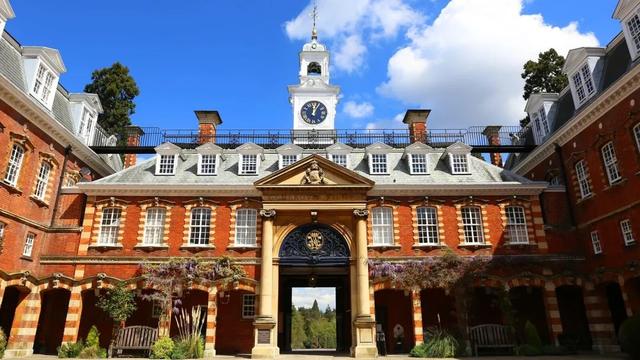
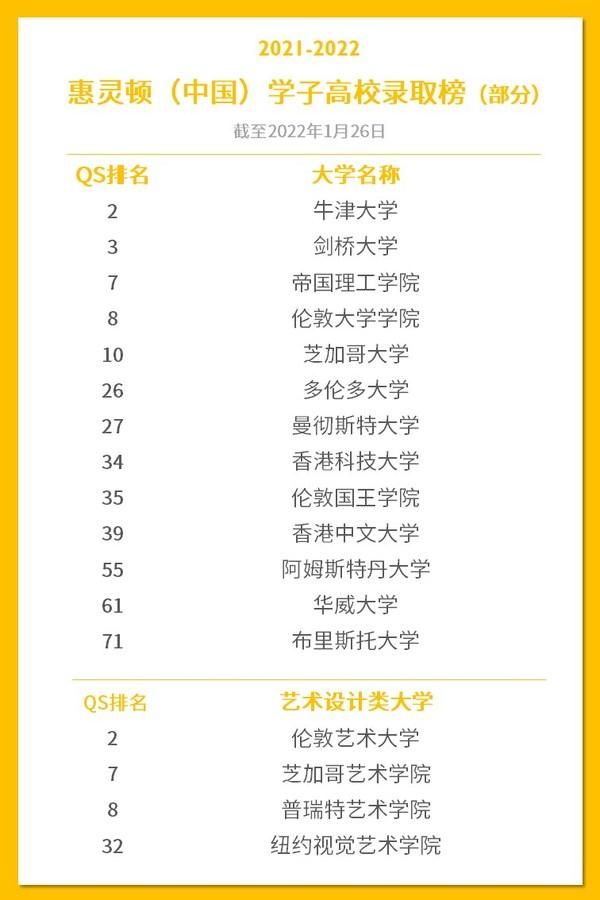
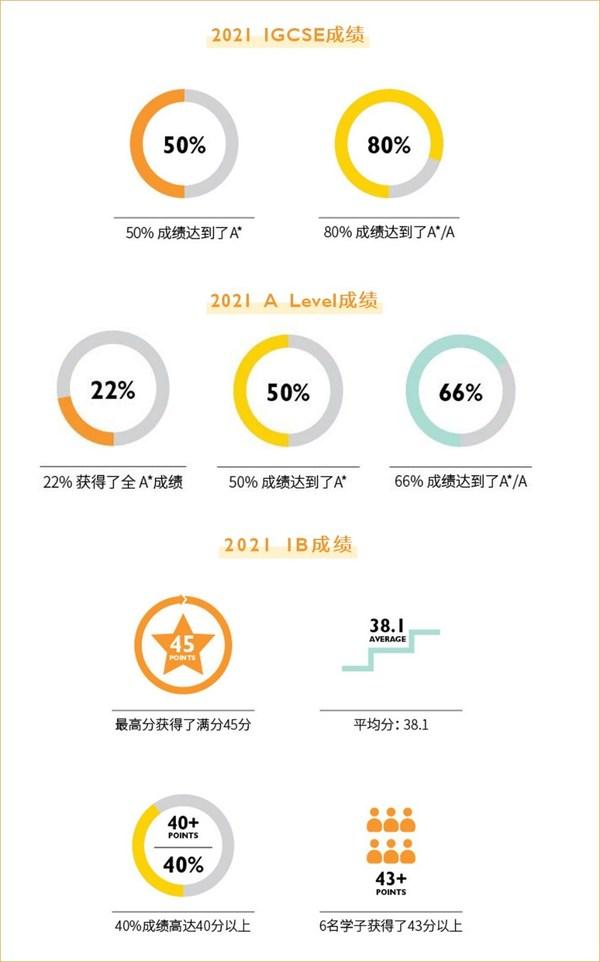


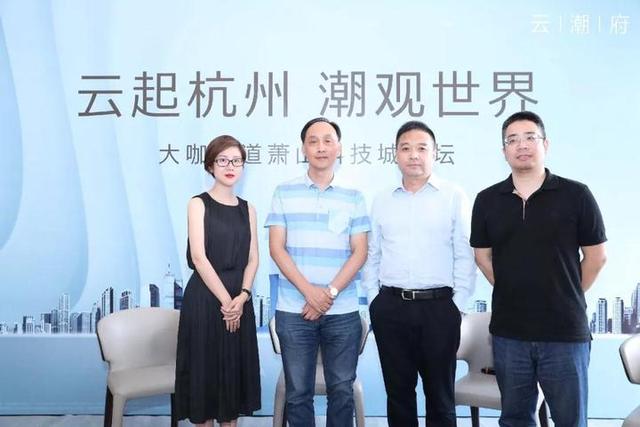












评论